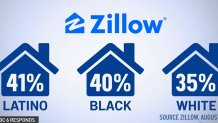If you are looking for a place to rent in South Florida, you may have noticed rising rent costs.
According to data from Zillow, in August the average rent in the Miami/Fort Lauderdale metro area was up 20% when compared to the previous year.
“I have not seen any jump like that ever, not only since I am an adult and working in real estate, but also looking at the data historically,” Dr. Eli Beracha said.
Beracha is the director of the Hollo School of Real Estate at Florida International University. He says the spike in rent prices is tied to the spike in home prices, and this could be an indicator the higher prices are here to stay.
The Hurricane season is on. Our meteorologists are ready. Sign up for the NBC 6 Weather newsletter to get the latest forecast in your inbox.
“They take whatever the market gives them, so as long as the consumer is able to pay more, they will charge more,” Beracha said.
The higher housing costs equal less money renters have to pay other bills.
“Rising rent prices take a major chunk out of people’s paychecks,” Zillow Senior Economist Jeff Tucker said. “A common metric is around 30 percent or a third of your income, but we see a lot of renters flying past that benchmark.”
An analysis by Zillow found Latino households have 41% of their income going to rent. Black households had about 40% of their income going to rent. This is compared to 35% for white households.

“All of this leads up to a much tighter budget, and a much more difficult time dealing with rent increases for renters of color,” Tucker said.
Responds
Responding to every consumer complaint
Finding a place to rent can be even more challenging if you are using a housing voucher.
“I found a place, the landlord was willing to rent to me, he wanted $1,900. The Section 8 Voucher told him they would only pay $1852,” Keisha Guyton said.
Keisha Guyton has been looking for a place to rent since May. She says she’s been passed up by landlords looking to make more money than her voucher would pay.
“Forty-eight dollars less and he was like, ‘hey, I can get somebody to pay that and more,'” Guyton said one landlord told her.
There are local ordinances to prevent landlords from refusing tenants based on their source of income.
“Proving that a landlord has been discriminating against people systematically is a very long process,” Attorney Denise Ghartey said.
Ghartey works with the Community Justice Project and says source of income discrimination is just one more potential barrier renters must overcome.
And if the rental market does not cool off it could force longtime residents out.
“It will force people like me who are born and raised in Miami, to not be able to live here,” Guyton said.



